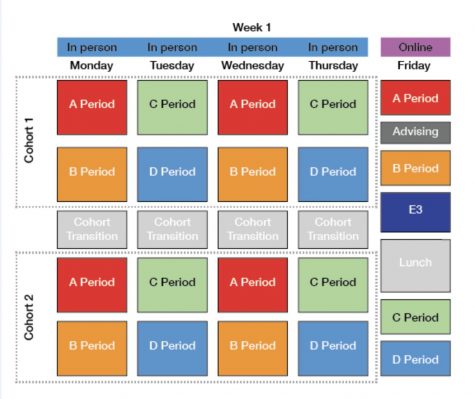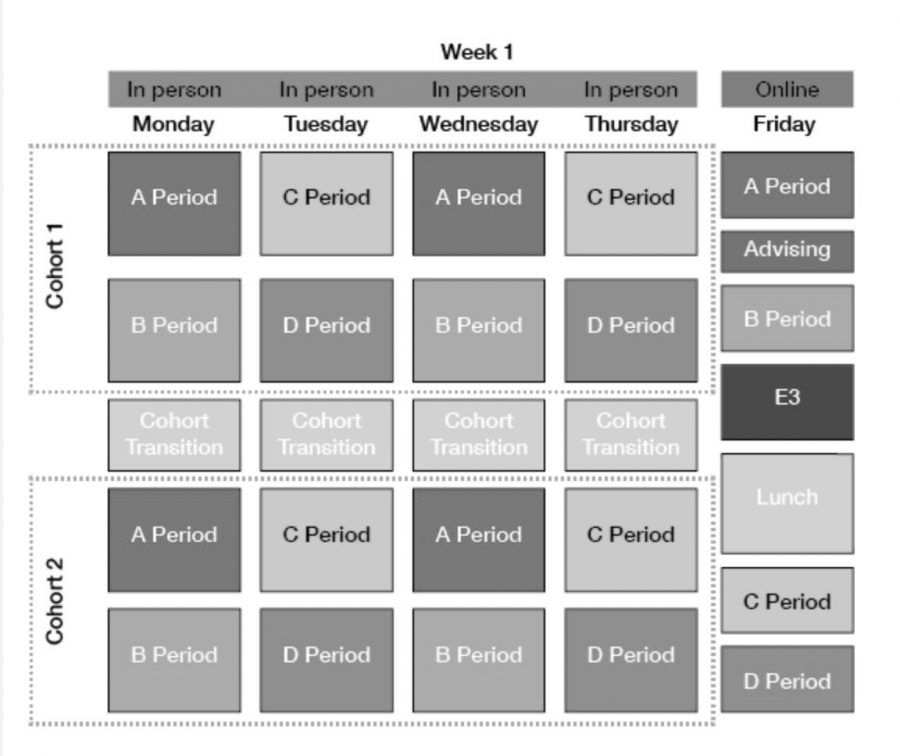Urban’s community prepares for a hybrid future
As Urban continues to familiarize itself with the COVID-19 pandemic, the community is challenged with trying to maintain safe conditions while simultaneously providing the hands-on, collaborative education which Urban so values.
In an all-school email sent on August 5th, Head of School Dan Miller, laid out a proposed plan for returning to school in the fall term. He explained that the school would follow a hybrid 4-10 model to uphold the Centers for Disease Control and Prevention’s novel coronavirus health guidelines. This school model allows for four days of in-person schooling where the day is divided into two sections. The student body will simultaneously split into two cohorts, each cohort attending a half day of in person school. After four days, the school goes back to the Virtual Urban schedule for ten days, then the process repeats.
“Our overarching priority,” said Geoff Ruth, assistant head for instruction, “was to focus on the health and safety concerns.” This meant creating a school environment that accommodates the needs of students, teachers, and staff, all of whom are coming from different household situations. This entire process involved lengthy reorganization.
The student body will be split into two separate groups called hybrid cohorts. The majority of Ruth’s summer has been dedicated to figuring out how to create these groups. “You just divide the student body in half, you know, the morning half and the afternoon half,” Ruth said. However, due to Urban’s class sizes being so small, if the classes were divided only alphabetically, “some classes have, literally one student in the morning or afternoon and 12 in the other half.” Ruth was tasked with creating cohorts that were as close to 50% of the student body as possible while still keeping siblings and advising groups together, resulting in cohorts that have “a lot of variation.”
Urban has not only made significant schedule changes, but it has also implemented new cleaning protocols. The school will now have a far more intricate sanitation process in accordance with health guidelines, focusing on high touch areas of the school. In order to limit the amount of these areas, the school installed touchless bathroom fixtures and hand sanitizer dispensers.
As students and teachers transition from one classroom to the next, they are to wipe down desks and frequently touched surfaces within the classroom.
During cohort transitions and after school, “the janitorial staff will implement an enhanced cleaning schedule with frequent cleaning of restrooms and high touch areas,” said Andrea Scally, office and logistics manager. “At the end of each day, there will be a thorough disinfecting of all areas of the school using electrostatic foggers that use a food-grade EPA approved chemical. These foggers pretty much allow the janitorial staff to disinfect an entire room in about 5 minutes.”
Ruth said that this new environment will be “super countercultural” for everyone in the Urban community. Along with the downsizing of already small class sizes, classrooms are now set up to be more spread out versions of “anodyne generic classrooms.” Desks will all be facing the same way and students will not be grouped together at one table as per usual. Though this creates a challenge to uphold Urban’s value of active student collaboration, the safety of the students is the priority. Chemistry labs are the one exception where two students will be divided by a plexiglass shield on a 5 foot long table. Common rooms such as the Student Center, Blues Lounge, and Old Library will be closed off or turned into classrooms because “it’s impossible to have people congregate socially in a way that is safe,” said Ruth.
“As the world’s understanding of, and response to, the virus has morphed, the wisdom on how to respond has morphed as have the guidelines from public health officials,” Miller said. If and when the Urban community returns to campus, it is critical that everyone follows guidelines and remains receptive to rapid changes as new research and regulations come out. “The overwhelming majority feel the loss of the full Urban experience, where the academic, social, co-curricular are made whole by our in-person experience,” Miller said, “I think we may miss it even more than we realize.”



